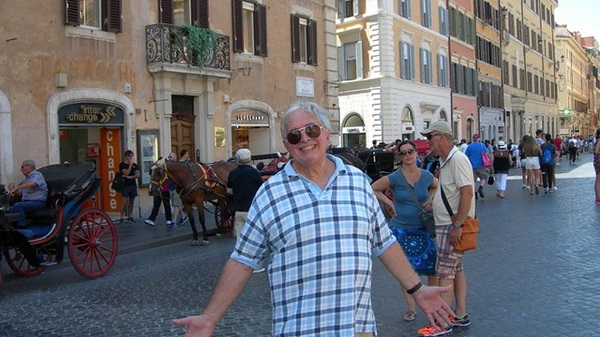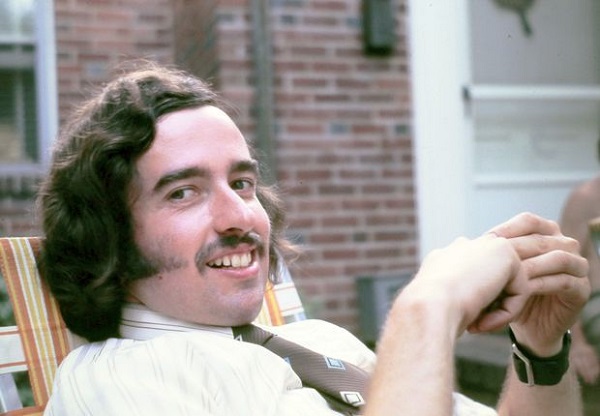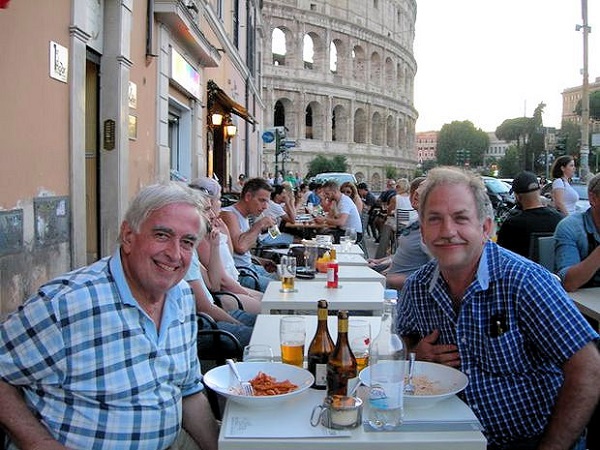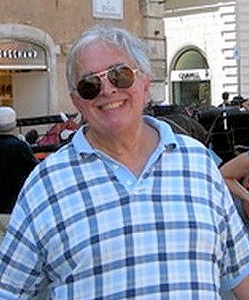 |
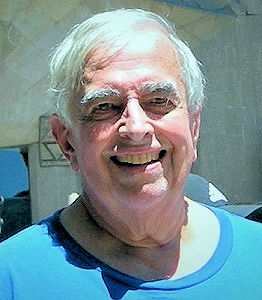 |
John S. Chitwood St Petersburg, FL QCWA # 32728 Chapter 20, 32 & 222 |
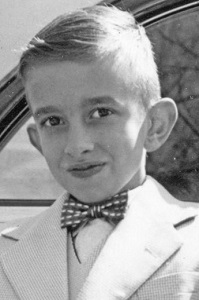 |
John Stephen Chitwood, 73, died in St. Petersburg, Florida on June 26, 2020. Born in Baltimore in 1946 to the late John Allen Chitwood, Jr. and the late Dolores Rita Chitwood (nee Popoli), he is survived by spouse John "Jake" Eckardt of St. Petersburg, Florida; brothers David J. Chitwood of Rockville and Robert A. Chitwood of Severn; and nephew Ryan K. Chitwood of Arlington, Virginia. A graduate of the Baltimore Polytechnic Institute, John received a Bachelor of Science degree in Electrical Engineering from Drexel University and completed substantial coursework at the graduate level at the George Washington University.
John began working at NASA's Goddard Space Flight Center as a work-study student in 1964; he retired 37 years later as Head of the Microwave Systems Branch, where responsibilities included developing communication systems for satellites and planetary probes. His passion for his amateur radio license he possessed for 59 years led to positions as Secretary and Treasurer for the Foundation for Amateur Radio; he served on its Scholarship Committee for 46 years.
Interment and a future service will be at Calvary Catholic Cemetery, Clearwater, Florida. Information on this or a possible memorial service in Maryland may be obtained from djchit@gmail.com. In lieu of flowers, mourners are encouraged to donate to the Maryland SPCA, www.mdspca.org, 3300 Falls Road, Baltimore, MD 21211, or the Human Rights Campaign, www.hrc.org, 1640 Rhode Island Ave NW, Washington DC 20036.
Published in Baltimore Sun on Jul. 19, 2020.
John Chitwood, a St. Petersburg resident, died at 73.
By Kristen Hare - Published Aug. 10 - Updated Sep. 21
Jake Eckardt is starting to sift through the boxes, the papers, the ham radio gear.
John Chitwood, his late husband, loved to build things and take them apart, but he rarely threw anything out.
Eckardt found the letters he wrote to Mr. Chitwood after they met in 1995 at a convention for ham radio operators. They were with other people then but stayed in touch. Eckardt didn't know Mr. Chitwood had saved the letters.
His awards from a 37-year career at NASA's Goddard Space Flight Center are scattered about the office, the garden shed and the garage.
And settled onto any available space - ham radio gear.
During his life, Mr. Chitwood connected with ham radio operators all over the world. Through his work at NASA on planetary probes and satellites, he helped connect this world to places way beyond it.
Mr. Chitwood, who was hospitalized for a fall and then tested positive for the coronavirus, died June 26. He was 73.
In the mid-1950s, Mr. Chitwood's grandfather brought home a 17-tube, Zenith shortwave radio, and before long, the elementary schooler took over a corner of his father's workbench and started building ham radios.
His first, brother David Chitwood remembers, was made from a metal file box.
Mr. Chitwood moved on to the radio club in high school at Baltimore Polytechnic Institute and got his novice license in ham radio in 1961.
He loved to talk to people, his brother said. on the radio, at family events, as a DJ at his college radio station at Drexel University. At 18, through a program between his university and the industry, Mr. Chitwood started working at NASA's Goddard campus in Greenbelt, Md.
There, he spent his career working on new ways to communicate.
At Goddard, Mr. Chitwood's desk was covered with neat towers of papers and technical magazines. He could find anything in those piles quickly, said Michael Powers, who worked for Mr. Chitwood in the Microwave Systems Branch.
Cathy Long worked for him, too, and chose his team when she joined NASA because, as one of the few women there at the time, she thought he'd be a supportive boss.
She was right.
He gave his young reports big jobs and hid in the back of group pictures, remember Powers and Long, who are married.
Mr. Chitwood worked on the Cosmic Background Explorer, or COBE. In 2006, two scientists won the Nobel Prize in physics 'for work that looks back into the infancy of the Universe and attempts to gain some understanding of the origin of galaxies and stars. It is based on measurements made with the help of the COBE satellite launched by NASA in 1989'.
'John was a major contributor to the success of that mission,' Long said.
'We had to be very careful in those days,' Eckardt said.
In 2002, Mr. Chitwood's long-time partner died.
More than a decade later, Mr. Chitwood stopped his brother as he started to leave a holiday gathering.
'There's something I have to tell you,. he said. 'I've fallen in love for the second time in my life.'
Mr. Chitwood and Eckardt moved to St. Pete in 2015. They married in 2017.
Here, Eckardt said, they traveled the world, had their best years together, made friends and memories.
One evening, Eckardt remembers, Mr. Chitwood took his husband to stand in the front yard. Eckardt looked up at the night sky. Mr. Chitwood looked down at his watch.
'The space station should be coming over the horizon,' he said.
'There it came,' Eckardt said. 'It was just a little star that flew across the sky'.
Got interested in shortwave radio when my grandfather brought a 17 tube Zenith radio (broadcast band to 18 MHz) to my parents. home in the mid-1950s. While I really I enjoyed listening to shortwave broadcasts, I enjoyed listening to ham stations on 40 and 75 meters AM even more. In the summer of 1960, I saw an ARRL novice license manual for sale at Ship.N.Shore radio in Ocean City, MD, so I bought it. Joined the radio club in high school (Baltimore Polytechnic Institute Radio Club/W3CDI), and learned Morse code. Studied the license manual, took the test, and received my Novice license, KN3RGB, in 1961.
I got right on the Novice bands (80 and 40) using a Hallicrafters S-38E and a one tube (117L7) crystal controlled transmitter that I built in a steel index card box. I also immediately began preparing for the General Class exam. It took me 4 visits to the FCC field office in Baltimore until I passed my 13 wpm receiving test. On that same 4th visit, I passed the written test and received my General Class license, K3RGB. This was followed by my Advanced Class license, and, some years later, after studying for the written test, and listening to W1AW code practice broadcasts, I earned my Extra Class license.
I was a frequent operator at W3CDI, taught code classes and license classes and served as Secretary and then President of the club. Joined the Baltimore Amateur Radio Club in which I served as Secretary for a couple of years. I was named as Club.s trustee for the Foundation for Amateur Radio. I was then elected to serve as the Secretary of the Foundation for Amateur Radio for a term or two.
Became the EC of the Baltimore Area AREC (now ARES), and was a member of the Baltimore City Civil Defense radio team in the 1960s.
Although not ham radio related, between April and September 1964, I was employed at Radio Baltimore WCAO where I served as a control room engineer, production studio engineer, and a maintenance engineer. While attending college, I was hired by NASA.s Goddard Space Flight Center as a student trainee and then after graduation, as an electronics engineer at NASA, from which I retired in 2001.
Joined QCWA in 2004 as a member of chapter 20. Later, also became a member of chapter 222 and 32.
Served as a member of the Foundation for Amateur Radio.s Scholarship Committee from 1972 to 2018. Assumed the responsibility of managing the Committee.s funds in the early 2000s, and was then elected Treasurer of the Foundation for Amateur Radio, a position in which I served until November 2018.
After moving to Saint Petersburg, FL in late 2015, I am still in the process of getting my station set up, but I have been continuously active on 80 . 10 meters mobile, VHF and UHF, and APRS. Now, residing in the Tampa Bay area, I am a member of chapter 32 where I am doing my small part in revitalizing the chapter as interim secretary.
